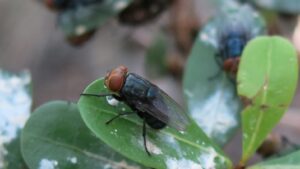President Donald Trump on Friday signed an executive order temporarily expanding the amount of beef the U.S. can import from Argentina, a move the White House says is aimed at…
US Pauses Restart of Mexican Cattle Imports due to Screwworm
Agri-Pulse’s Oliver Ward reported that “the Agriculture Department said Wednesday evening that the U.S. would be closing the southern border to livestock trade, effective immediately, after reports that New World screwworm has resumed its northward spread.”
“The announcement came just two days after USDA reopened a single port of entry for Mexican livestock in Douglas, Arizona. It had planned to gradually resume imports through four further ports in the coming months,” Ward reported. “In a statement, USDA said that a new case of New World screwworm in Veracruz state, around 160 miles north of where current efforts to disperse sterile flies are concentrated, and just 370 miles south of the U.S. border, warranted additional precautions.”

“‘The United States has promised to be vigilant — and after detecting this new NWS case, we are pausing the planned port reopening[s] to further quarantine and target this deadly pest in Mexico,’ Agriculture Secretary Brooke Rollins said, according to the USDA statement,” Ward reported.
Both U.S. and Mexico Stepping up Eradication Efforts
Ward reported that “both the U.S. and Mexico are planning to step up their screwworm eradication efforts. Around 90 million sterile flies are being dropped a week, according to correspondence between Rollins and Mexico’s Secretary of Agriculture and Rural Development Julio Berdegué obtained by Agri-Pulse.”
Reuters reported July 7 that “Mexico’s government said on Monday that it has started to build a $51 million facility in the country’s south as part of an effort to combat screwworm, a pest that has disrupted Mexican exports of cattle to the United States.”
“Mexico’s agriculture ministry said in a statement that the plant, a joint project with the U.S., will produce 100 million sterile screwworm flies per week once completed in the first half of 2026,” Reuters reported. “The release of sterile flies, which reduce the reproducing population of the wild flies, is a key tool in controlling the pest. The United States, Mexico’s biggest trading partner, is paying $21 million of the cost and Mexico is spending $30 million, the statement said.”
🚨 Due to a newly reported northward spread of New World Screwworm in Mexico, @SecRollins has ordered the closure of livestock trade through southern ports of entry effective immediately.
To ensure the protection of U.S. livestock herds, USDA is holding Mexico accountable by… pic.twitter.com/Q0uvUgDvl1
— Dept. of Agriculture (@USDA) July 10, 2025
“The U.S. also announced plans to open a sterile fly dispersal facility in Hidalgo County, Texas, as part of the country’s fight against screwworm,” Reuters reported.
Industry Group Reactions Differ
Ward reported that “the National Cattlemen’s Beef Association had praised Rollins’ decision to reopen the southern border to livestock imports and hoped it would ease the economic pain for cattle producers who rely on Mexican feeder cattle for their stocks.”
However, Brownfield Ag News’ Kellan Heavican reported that “the CEO of R-CALF USA says the phased reopening of ports along the southern border to live cattle imports from Mexico could jeopardize the U.S. cattle industry.”
“Bill Bullard says the northward spread of New World screwworm in Mexico is still very much a threat and is disappointed with USDA’s decision,” Heavican reported. “‘We have the ability to keep it out of our nation but have to act decisively. We need to close the border. We need to help Mexico and Panama contain the pest. We need to leave no stone unturned.'”
Bullard “says the U.S. should not rely on other countries for beef imports and needs to focus on rebuilding the domestic supply chain,” Heavican reported. “‘This issue highlights the need for the United States to sever its dependency on foreign supply chains for food, and this isn’t the first time we’ve seen a disease outbreak upon a country where we’ve depended for beef cattle, sheep or lamb and it won’t be the last.'”





